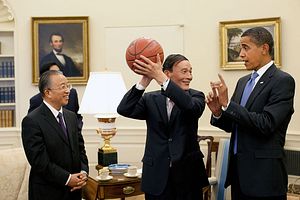Young Americans overwhelming favor stronger economic ties with China a new poll has found.
A new Pew survey finds that nearly three-fourths of Americans under the age of 30 want stronger economic ties with China, which is much higher than their older cohorts. “Fully 72% of those under 30 prioritize stronger U.S. economic ties with China compared with just 23% who say it is more important to get tough with China,” Pew wrote in a blog post published on its website on Wednesday to coincide with the U.S.-China strategic and economic dialogue in Beijing this week.
By contrast, just 42 percent of Americans over the age of 65 say it is more important to improve economic relations with China, while 48 percent of the same age group say that getting tough on China is more important. In fact, the 18-29 age group was the only to have a majority of respondents say that it is more important to improve economic ties with China than it is to get tough on it.
Still, Americans views on economic ties will China have greatly improved from just a few short years ago. Overall, 51 percent of the over 3,000 Americans surveyed by Pew say that it is more important to strengthen economic ties with China than to get tough on it. By contrast, 41 percent of respondents say that getting tough on China is more important (eight percent say they do not know which is more important.)
These figures are a nearly perfect mirror image from Americans’ views two years ago. When Pew asked the same question back in 2012, 49 percent of respondents said it was more important to get tough on China while only 42 percent believed that improving economic ties should take precedence.
The latest survey results are also somewhat at odds with a Pew survey from November of last year, which found that 59 percent of Americans believe that China’s economic power poses a greater threat to the United States than its military. This compared with the 28 percent of respondents who felt China’s military power poses a larger threat to the United States. The November 2013 survey did find that only 22 percent of Americans see China as an adversary, although an additional 43 percent feel that Beijing is a major problem that needs to be dealt with.
Consistent with prior polls, Pew’s latest survey finds that partisan affiliation strongly impacts Americans’ views on economic ties with China. A majority (53 percent) of self-identified Republicans believe it is more important that America get tough with China economically, while only 40 percent say the U.S. should focus on strengthening ties. By contrast, 57 percent of self-identified Democrats say strengthening ties should take precedent compared with 36 percent who advocate getting tough with China. Independents fall somewhere in the middle with 54 percent advocating strengthening cooperation and 39 percent supporting getting tough with Beijing.
In some ways, it is counterintuitive that millennials (note: millennials technically are 18-33 year olds) are the strongest supporters of improving economic ties with China. Many Americans associate China’s economic rise and greater Sino-American trade with U.S. jobs being outsourced to China where labor costs are lower. To the extent this sentiment holds true for millenials, they should be more opposed to stronger ties than other Americans given that millenials have been hardest by the financial crisis and also the slowest to recover. New research by Georgetown University found that 40 percent of unemployed workers in America are millenials well countless others are underemployed. Only 22 percent of America’s unemployed workers are baby boomers.
Similarly, it is counterintuitive (at least from an economic perspective) that Americans over the age of 65 are the group least in favor of strengthening economic ties to China. In the United States 65 is the retirement age, and therefore individuals older than 65 are likely to be retired and living on a fixed income. Consequentially, they are not at risk of losing their jobs to outsourcing and at the same time they benefit significantly from the cheaper goods that greater imports and outsourcing can yield for American consumers.
Another interesting finding from the survey is that millenials are the most likely age group to have an opinion on the question of whether American should prioritize strengthening economic ties with China or getting tough on it. Only 5 percent of millenials say they don’t know when asked this question, compared with 10 percent of those over the age of 65, 9 percent of Americans between the ages of 30-49, and 8 percent of Americans of between the ages of 50-64.

































